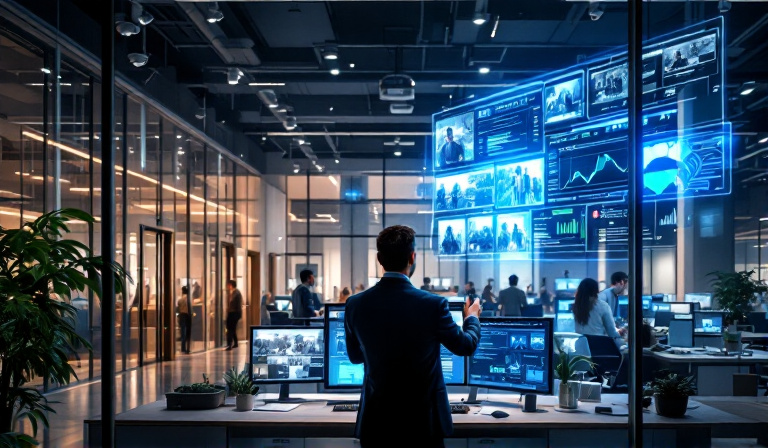
In today's rapidly evolving landscape, ensuring the security of your business is more critical than ever. Whether you operate a small retail store or a large corporate enterprise, commercial security is a fundamental concern that every business owner must prioritize. From safeguarding physical assets to protecting sensitive data, a comprehensive approach to security can mitigate risks and enhance business resilience.
Understanding the Importance of Commercial Security
Commercial security encompasses a wide range of strategies and technologies designed to protect your business environment. The primary goals are to deter potential threats, detect unauthorized access, and respond efficiently to incidents. Implementing a robust security plan not only protects your assets but also instills confidence in your clients and employees.
Identifying Your Security Needs
Before implementing any security measures, it's crucial to assess your specific needs. Consider factors such as the size of your premises, the nature of your business, and any industry-specific regulations you must adhere to. Conducting a thorough risk assessment can help you identify potential vulnerabilities and prioritize areas for improvement.
Physical Security Measures
Physical security is the first line of defense in protecting your business. Here are some key components to consider:
- Access Control Systems: Implementing access control systems can restrict entry to authorized personnel only. This can include card readers, biometric scanners, or keypad entry systems.
- Surveillance Cameras: Installing CCTV cameras in strategic locations can deter criminal activity and provide valuable evidence in the event of an incident.
- Alarm Systems: A well-designed alarm system can alert you and the authorities to unauthorized entry or suspicious activity, enabling a swift response.
- Lighting: Adequate outdoor and indoor lighting can deter intruders and improve camera visibility during nighttime hours.
- Security Personnel: Depending on the size and nature of your business, hiring trained security personnel can provide an additional layer of protection.
Cybersecurity Considerations
In our digital age, cybersecurity is just as important as physical security. Protecting your business from cyber threats is essential to safeguard sensitive information and maintain operational integrity.
- Firewalls and Antivirus Software: Ensure that all computers and networks are protected by robust firewalls and up-to-date antivirus software to prevent unauthorized access and malware attacks.
- Data Encryption: Encrypt sensitive data both in transit and at rest to protect it from unauthorized access.
- Regular Software Updates: Keep all software and systems updated to patch vulnerabilities and enhance security features.
- Employee Training: Educate your staff about cybersecurity best practices, such as recognizing phishing attempts and creating strong passwords.
- Backup Solutions: Implement regular backup procedures to ensure that critical data can be quickly restored in the event of a cyber attack.
Integrating Technology for Enhanced Security
Leveraging the latest technology can provide enhanced security solutions for your business. Consider integrating smart technology to streamline security operations:
- Smart Locks: Allow remote access control and monitoring, providing flexibility and enhanced security for your premises.
- AI Surveillance Systems: Utilize artificial intelligence to analyze video footage in real-time and detect unusual activities.
- Cloud-Based Security Solutions: Employ cloud technology for scalable and efficient data storage and monitoring.
- IoT Devices: Integrate Internet of Things (IoT) devices for real-time alerts and seamless connectivity between security systems.
Developing a Comprehensive Security Plan
Creating a comprehensive security plan involves more than just implementing individual security measures. It requires a holistic approach that encompasses all aspects of your business operations.
- Conduct Regular Audits: Regularly review and update your security protocols to address new threats and ensure compliance with industry standards.
- Emergency Response Planning: Develop and communicate clear emergency procedures for various scenarios, ensuring all employees are aware of their roles and responsibilities.
- Partnership with Security Experts: Collaborate with professional security consultants who can provide insights and recommendations tailored to your specific business needs.
- Community Engagement: Engage with local law enforcement and business communities to stay informed about local security trends and collaborate on crime prevention initiatives.
Maintaining Business Continuity
Effective security measures contribute to business continuity by minimizing the impact of security breaches and ensuring rapid recovery. Here are some strategies to maintain continuity:
- Disaster Recovery Plans: Develop comprehensive disaster recovery plans to address both physical and cyber incidents, ensuring quick restoration of operations.
- Insurance Coverage: Secure appropriate insurance coverage to mitigate financial losses from security incidents.
- Regular Drills: Conduct regular drills to test response plans and ensure that employees are prepared for various security scenarios.
In conclusion, the security of your business should never be an afterthought. By understanding your unique security needs, implementing both physical and cyber measures, and continuously evaluating and updating your strategies, you can create a safe and secure environment for your organization to thrive. Remember, investing in security is an investment in the future success and reputation of your business.

